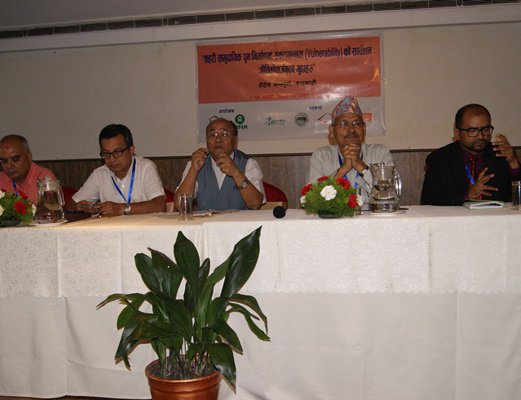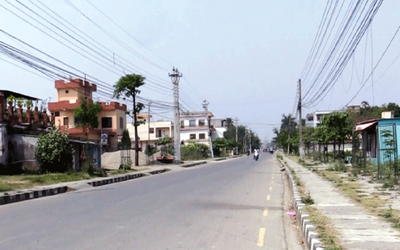
The last year's earthquakes have shown that the urban settlements are more vulnerable during such disasters. However, efforts to reduce such vulnerabilities are still missing in the post-earthquake reconstruction works.
Although several organisations have been supporting various earthquake reconstruction programs, only a few organisations have looked at the vulnerabilities in post earthquake reconstruction in urban areas.
With the partnership organisations LUMANTI, DEPROCS, CIUD, HomeNet Nepal and ENPHO, Oxfam recently organised program addressing vulnerabilities of urban communities in post earthquake reconstruction: issue of livelihood.
Speakers emphasized on addressing vulnerabilities of urban communities in post earthquake reconstruction.
“Urban livelihood should be resilient and the organizations working for the supporting the victims should run their programmes by understanding the needs of the victims," said Dr. Bishnu Bhandari, executive member of the National Reconstruction Authority (NRA). "There is the need to create employment and provide social security to address the issue of livelihood in reconstruction post earthquake. Such discussion will help NRA as it has the issues of recovery and livelihoods fall under the priority of the NRA.”
With existence of diverse population, the social and economic structure of Kathmandu’s urban structure is complex. The post reconstruction program needs to address all of them.
“There are five types of poor in Kathmandu Valley and they are socially marginalized groups, renters, squatters, those living in the outskirts of the valley and poor inhabitants,” said Padam Sundar Joshi, program manager at UN-HABITAT. “As the houses are also sources of income for many families in the valley, such types of income halved after the earthquake since the houses were destroyed or damaged during the earthquake in April 2015.The cooperative housing plan proposed by the government a year ago should be implemented immediately.”
Urban issue needs to be addressed through multiple approaches. “There is the need for adopting integrated approach to address the urban issues,” said Umesh Dhakal, Chief of the Earthquake Response Operations of Nepal Red Cross Society. “The issues of shelter, livelihood, water, sanitation, and hygiene should be addressed simultaneously.”
Participated by representatives from Ministry of Federal Affairs and Local Development, different municipalities of Kathmandu, Lalitpur and Bhaktapur Districts, NGOs and others, the program saw the participants expressing concern over the rise of urban poor.
“As per the report of the Post Disaster Needs Assessment (PDNA) the earthquake gives rise to poverty in Nepal by 3 percent,” said Bimal Gadal, Sustainable Development Director of Oxfam in Nepal. "Discrimination and inequality also contributed to increasing poverty and unequal access to services leads to rural urban migration.”
Three papers were presented by experts in the program. Puskar Shrestha, Om Thapaliya and Niranjan Rijal presented the papers on informal urban settlements, policies and practices for promotion of livelihoods in urban areas and sustainable livelihoods of earthquake affected families in urban areas respectively.
“Reconstruction policies and standards for urban areas need to be clear and also asked to standardize the works of non-governmental organizations,” said former chairperson of LUMANTI, Prafulla Man Singh Pradhan. “Municipalities should be allowed to work independently on post earthquake reconstruction and NGOs should support them."
As the post earthquake reconstruction has been delayed almost one and half years, it is affecting the livelihood of poor community of urban areas. According to an estimate, over 80 percent of houses destroyed in urban areas of Kathmandu are owned by the poor people.
With the loss of houses, the people not only have lost their place of living but also have lost the sources of income made through renting the rooms. Urban post reconstruction needs to address these things. Otherwise, the number of poor and people living below the poverty line will increase, according to OXFAM, which has rightly raised the issue.
- TANAHU HYDROPOWER PROEJCT: A Significant Achievement
- Apr 15, 2024
- AMBASSADOR HANAN GODAR: Sharing Pain With A Nepali Family
- Mar 30, 2024
- VISIT OF KfW AND EIB TO NEPAL : Mission Matters
- Mar 25, 2024
- NEPAL BRITAIN SOCIETY: Pratima Pande's Leadership
- Mar 24, 2024
- NEPAL ARMY DAY: Time To Recall Glory
- Mar 15, 2024
















